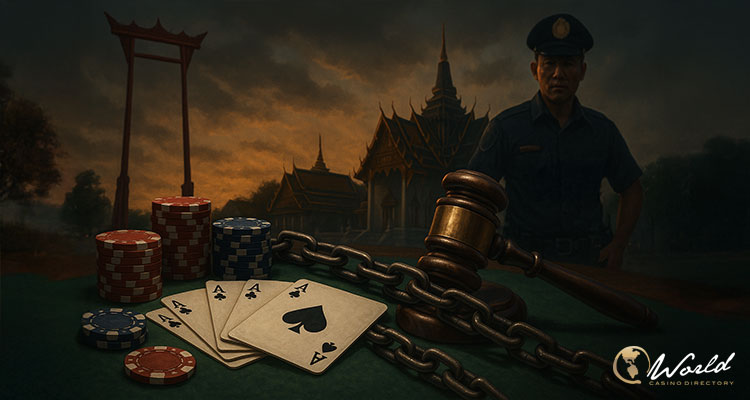Thailand’s newly appointed Prime Minister Anutin Charnvirakul has reinstated the country’s long-standing ban on poker, reversing a recent move by his predecessor that had briefly legalized the card game. Acting also in his capacity as Minister of the Interior, Anutin signed a ministerial order this week that immediately reimposed the nationwide prohibition on poker games.
The decision annuls an earlier order issued on July 30 by Phumtham Wechayachai, who served as interior minister during the previous Pheu Thai-led government. Phumtham’s order had decriminalized poker for the first time in nearly seven decades, allowing it to be played as a sport under controlled conditions.
Order Revoked in Line with Government’s Anti-Gambling Agenda
According to the Department of Provincial Administration, the latest reversal aligns with Anutin’s government policy statement delivered on September 29, which explicitly pledged to suppress all forms of gambling — including those presented as skill-based or disguised as sports. The new directive, formally identified as Interior Ministry Order No. 2253/2568, underscores the administration’s zero-tolerance stance toward gambling in any form.
“Poker games were also considered a form of gambling, despite being promoted as a sport,” Anutin stated in the order. He further emphasized that his administration would not support any form of legal gambling businesses, including casino entertainment complexes or other initiatives previously promoted under the Pheu Thai administration.
The revocation took immediate effect upon signing, halting all poker tournaments and associated promotional activities that had gained traction following the temporary legalization.
As reported by the Bangkok Post, Phumtham Wechayachai, who briefly replaced Anutin as interior minister after the Bhumjaithai Party exited the former ruling coalition earlier this year, had lifted the country’s 67-year-old ban on poker with the aim of positioning Thailand as a regional hub for international poker tournaments. His decision coincided with a major poker event that began just one day after the order was signed — a coincidence noted at the time by Bhumjaithai Party members as politically sensitive.
Following Phumtham’s order, the Ministry of Tourism and Sports clarified that poker would only be recognized as a sport under oversight from an authorized association. Then-Minister Sorawong Thienthong stressed that the policy change “was not the legalisation of gambling in general.”
Despite these assurances, the brief experiment with poker’s legality faced growing political opposition, especially from Anutin’s Bhumjaithai Party, which had long resisted broader gambling reforms — including proposals to legalize casino resorts through the Entertainment Complex Bill.
Political Context and Broader Gambling Crackdown
Anutin’s reversal marks another step in dismantling the gambling-friendly agenda pushed by the previous government. Earlier this year, the Pheu Thai Party had pursued legislation aimed at legalizing casino resorts to stimulate tourism and economic growth. However, the draft bill was withdrawn from Parliament in July, coinciding with escalating political instability that culminated in the Constitutional Court’s removal of then-Prime Minister Paetongtarn Shinawatra in August.
Anutin, who assumed the premiership in early September 2025, had already signaled his opposition to using gambling liberalization as an economic driver. In line with that stance, he reaffirmed his commitment to preventing both land-based and online gambling expansion.
Under the current policy framework, all forms of poker — including tournaments previously approved under Phumtham’s tenure — are now strictly prohibited once again. The decision effectively restores Thailand’s longstanding prohibition on gambling, reversing one of the few modern attempts to reinterpret poker as a legitimate sport rather than a betting activity.



